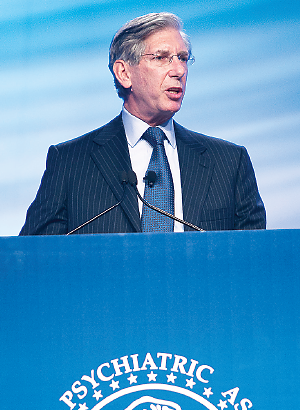Lieberman Says it’s ‘Our Time’ for Equity and Fairness in Mental Health
Abstract
The new APA president cites astonishing advances in psychiatric research and a broad acceptance of the importance of mental health as reasons to be optimistic.
This is “our time,” said incoming APA President Jeffrey Lieberman, M.D.—time for psychiatry to seize on its advantages and realize a long-deferred dream of equity and recovery for people with mental illness.

Speaking at the Opening Session of APA’s 2013 annual meeting in San Francisco last month, Lieberman said he was angry about the continued stigma associated with mental illness and disparagement of psychiatry in some quarters.
Quoting the 1976 movie “Network,” he said he was “mad as hell and not going to take it” anymore. “Although I saw this movie 37 years ago, I have recently thought about that scene in ‘Network’ because as I view what is happening to the field of psychiatry and all of mental health care, I feel ‘mad as hell, and I don’t want to take it anymore.’ The truth be told, that is why I ran for APA president—because I felt mad and wanted to use all of the power and influence of APA to speak up and stick up for our profession and our patients.
“Throughout my career, I have been acutely sensitive to the stigma associated with mental illness, the disparities in mental health care, and the lack of respect toward psychiatry as a medical specialty,” Lieberman said. “I suppose there might have been a time when psychiatry wasn’t as scientifically based as it should have been. But that was then, and now is now. For such attitudes and practices to persist in the 21st century is nothing short of discriminatory and prejudicial.”
But persist they do, he said. Lieberman noted that the mental health parity law was signed in 2008, yet no final rule on its implementation has been issued. He added that the recession of 2008 has gutted public mental health systems and encouraged private and voluntary hospitals to cut psychiatric services, as at Cedars Sinai Hospital in Los Angeles, which closed its psychiatry department.
“The pharmaceutical industry has all but abandoned the development of novel psychotropic drugs,” he said. “And DSM-5 has become a lightning rod for self-styled critics and the antipsychiatry movement. Mental illness is alternatively feared too much or not taken seriously enough, and psychiatry continues to be a punch line for jokes.”
Yet at the same time, Lieberman said, he felt profoundly optimistic about the future.
“From a public-health perspective, people and policymakers alike have finally started to realize that brain diseases and mental disorders are among the most important causes of disability in our society,” Lieberman said. “And then there’s the amazing science. The scientific foundation of psychiatric medicine has grown by leaps and bounds in the last 50 years. The emergence of psychopharmacology, neuroimaging, molecular genetics and biology, and the disciplines of neuroscience and cognitive psychology have launched us into the mainstream of medicine and on a course for future growth and success. Though not everyone, including ourselves, is satisfied with the rate of our field’s progress, no one can argue with one simple fact—if you or a loved one suffers from a mental illness, your ability to receive effective treatment, recover, and lead a productive life is better now than ever in human history….
“It is for these reasons that despite the lingering effects of stigma and inequity, I say that this is our time, and our time is within our professional lifetimes,” Lieberman said. He urged members individually and collectively to fight for the rights of patients and respect for the psychiatric profession.
He pointed out that APA has a key role to play in this process. “APA is our best weapon in the fight for respect and equality both for our patients and our profession,” he said. “Therefore, I am calling on APA to redouble its efforts in representing our profession both inside the Beltway and across the country at the grassroots level of the membership and district branches. This is the time for us to seize the moment, for mental illness to step out of the shadows, for mental health care to be made accessible and fairly reimbursed, and for psychiatry to take its rightful role in the field of medicine.” ■
Lieberman was interviewed by Psychiatric News Editor-in-Chief Jeffrey Borenstein, M.D., during the annual meeting. To watch the video, go to http://www.youtube.com/watch?v=mctrZtjvFrU.



